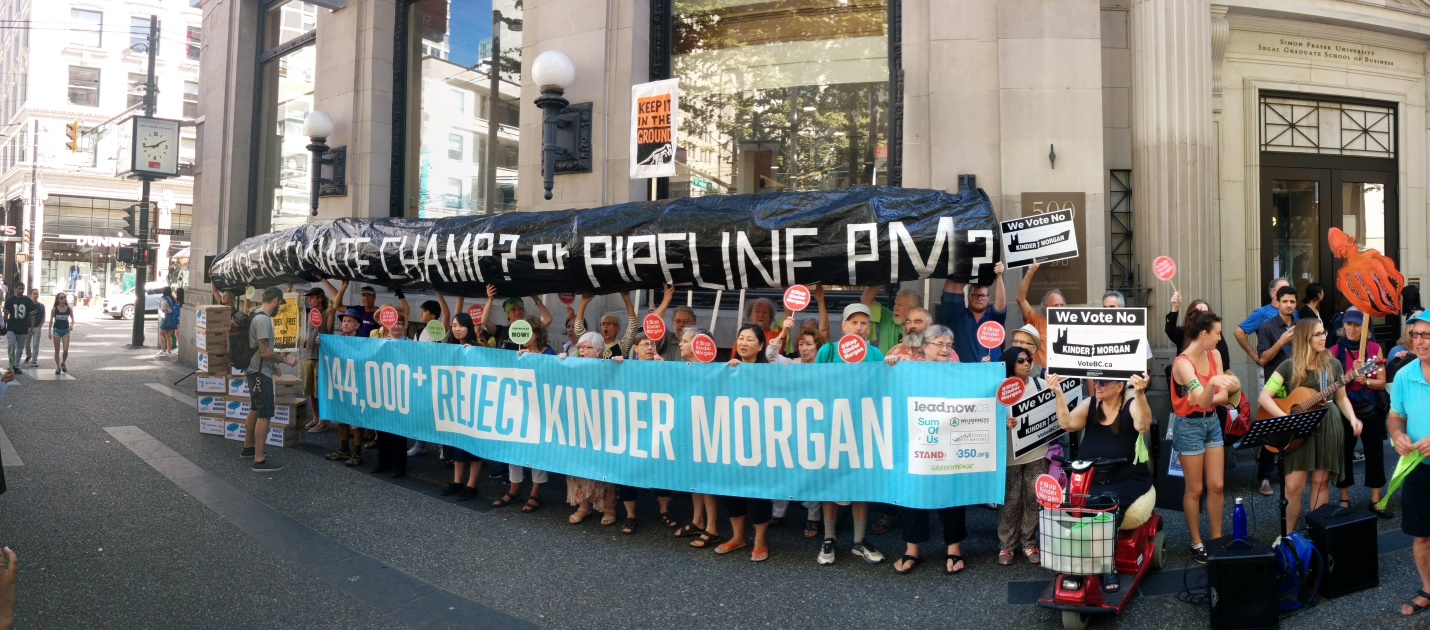

A large crowd gathered inside and outside the Kinder Morgan Summer meetings in Vancouver. Photos: Eugene Kung
The Kinder Morgan summer meetings are over, with online comments closing on September 30th. The report from the Ministerial Panel is expected on November 1, 2016. The report will be considered by Federal Cabinet in its upcoming decision, along with the upstream greenhouse gas analysis (read here on why we think this is insufficient), the flawed National Energy Board (NEB) report, and any further information arising from First Nations consultation.
You may recall that the summer meetings were announced as a part of the federal government’s attempt to restore the public’s faith in our regulatory systems. The process has moved quickly since then. The principles for the NEB transition phase were announced in the winter. The panel members were announced in the spring. And the meetings were held in the summer.
Like the NEB hearings they were meant to fix, the summer meetings were not without controversy: allegations of conflict of interest over Kinder Morgan ‘partner’ Kim Baird being appointed to the Panel and acting as de facto chair; imposition of a tight timeline, without input from or adequate notice to First Nations. And, as was apparent to anyone who attended, the Panel seemed ill prepared to deal with the breadth and depth of participants, with no transcripts or list of participants and no decision-making power.
Despite these lumps, the meetings did produce some magical moments, like this amazing speech by Mary Leighton (my former soccer teammate!):
Indeed, at the meetings in BC, over 90% of speakers spoke in opposition to the project.
Then things got weird….
Kim Baird did a press circuit, penning an op-ed in the Globe and Mail, and doing interviews for the Vancouver Sun and a cover story in Alberta Oil Magazine – in which Ms. Baird revealed that she and the Panel met with Kinder Morgan prior to starting their summer meetings.
Imagine a judge or adjudicator talking about a case to the media during a trial, or meeting with one of the parties outside the process? It would immediately get sent to re-trial. Just ask Jean Charest, NEB Chair Peter Watson, or the NEB members who resigned from the NEB’s Energy East pipeline review.

Kim Baird appeared on the cover of Alberta Oil Magazine’s September edition, while the Ministerial Panel was meeting with the Public.
In her op-ed, Ms. Baird revealed that over 16,000 people had filled in the online survey or submitted comments to the Panel’s email address.
We encouraged our followers to fill out the survey and submit comments prior to the Sept 30th deadline. Our friends did the same, as did pro-pipeline organizations.
Then, just two days before the deadline, after thousands of messages were sent to the panel, we started hearing about an email from the panel, saying that “input from mass email campaigns initiated through third party web sites will not be considered when they contain content which is repetitive, irrelevant to the mandate of the Panel, or not identifiably sent by Canadians.”

We were immediately troubled by this arbitrary limit on expression, based solely on the method of communication (third party web sites) and alerted the BC Civil Liberties Association. The BCCLA filed a letter on September 30th to the Panel, stating (inter alia):
This last minute change strikes us as unclear and arbitrary and will erode public confidence in the fairness of this process – which has already been the subject of public criticism in relation to its process. We have expressed our concerns in the past about the National Energy Board shutting out the public from its hearings and making public participation difficult – this move by the Panel reinforces these concerns.
[…]
The introduction of these new rules of engagement, just two days before the deadline to submit, is unfair and arbitrary. In addition, it is an unreasonable interference with the freedom of expression of these individuals and their participation in a government public consultation process. Many individuals on either side of the issue choose to express their individual opinions to the Panel using the facilitation of a third party group with which they associate or that they support. This has always been a feature of democratic life as people have come together in associations, signed petitions, and organized. Their opinions should not be rejected by the government simply because they choose to express them to the Panel in individualized emails that are collected and sent by a group that they support.
[…]
Limiting the easiest and most utilized method of communication also violates the spirit and intent of the Panel’s mandate to “create further opportunities for people from potentially affected communities close to the proposed pipeline and shipping route to provide their views on the project.” Disqualifying views based solely on the method of communication, only days before the submission deadline unfairly excludes the views of thousands of Canadians who have relied on the publicly available methods of communication.
On October 4th, BCCLA and many of the groups who had received the initial email got the following response, itself ironically a mass email:

So good news for democracy lovers: your opinions will be considered. But not before the Panel tried to reject huge amounts of input arbitrarily. We have heard anecdotally that this has also been happening in other federal public consultations, including processes regarding the Trans Pacific Partnership (reportedly also reversed) and the government’s killer whale recovery strategy.
What remains to be seen, however, is how the Ministerial Panel will deal with the tens of thousands of messages and questionnaire responses in its final report. And beyond that, how Prime Minister Trudeau will incorporate all of this information into his decision in December. Will he maintain his position that “only communities grant permission?” Or will he approve the project in the face of strong opposition?

Burnaby Mountain November 2014 photo: Eugene Kung
By Eugene Kung, Staff Counsel